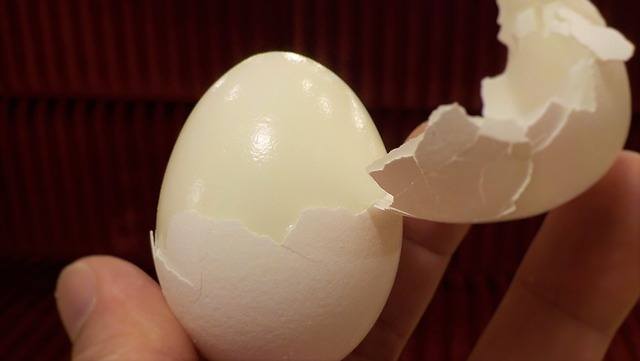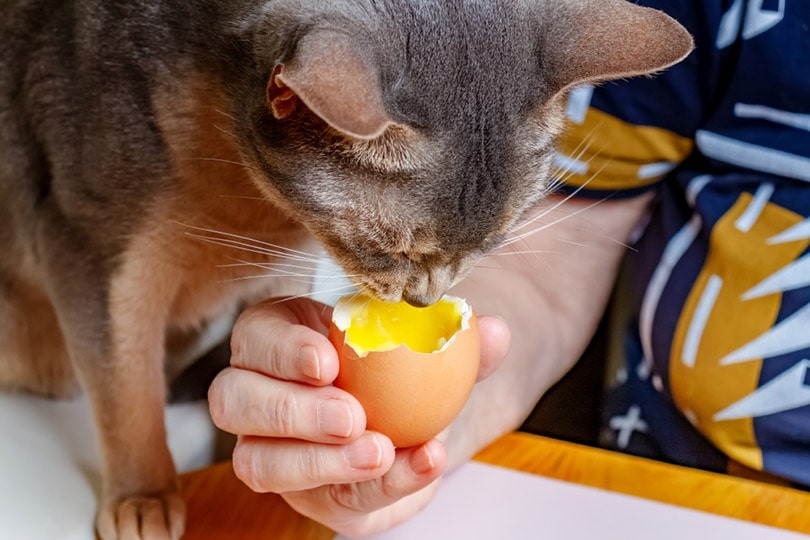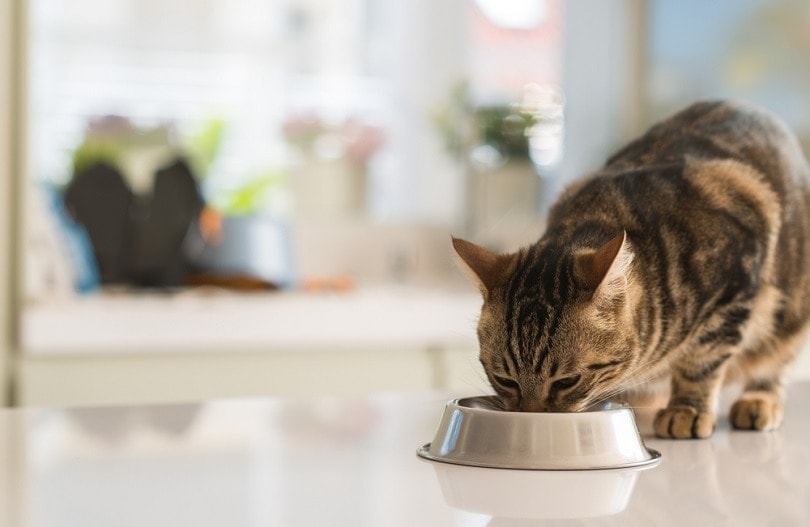Can Cats Eat Raw Eggs? Vet Reviewed Facts & FAQ
By Beth Crane
Updated on

It’s common knowledge that cats are brilliant hunters. They can climb easily, and it’s easy to imagine them sneaking up to a bird’s nest to steal the babies inside. But what about the eggs? While some animals can snack on eggs, cats shouldn’t eat raw eggs. Raw eggs are at risk of carrying salmonella and other bacteria that can make your cat sick, so any eggs given to your kitty should be thoroughly cooked.
Raw eggs produced in the United States can contain salmonella bacteria. Salmonella causes salmonellosis in cats, and because it’s zoonotic, your cat can easily spread salmonella to you and your family.
Why Can’t Cats Eat Raw Eggs?
The CDC states that salmonella can get on the outer shells of hen’s eggs by touching birds carrying it on their bodies.1 The floors of the areas they’re kept in can also harbor bacteria, and it’s not uncommon for eggs to come into contact with the poop of infected birds. Salmonella can also get into the eggs themselves, meaning that any part of a raw egg is risky.
Cooking kills the salmonella bacteria, so you and your cat can safely eat well-cooked eggs.

Will My Cat Get Sick From Eating a Raw Egg?
It’s not guaranteed that your cat will get sick from eating a raw egg, but the risk is high enough. One in every 20,000 eggs contains salmonella, which seems like a small number.2 However, your chances seem more likely when you consider the number of eggs eaten a year in the US (225 eggs per person) or the 269 million eggs produced yearly.
When cats get infected with salmonella (salmonellosis), it can cause a range of adverse effects. Because salmonella is zoonotic, it can be spread from your cat to your other pets and your family.
The signs of salmonella infection in cats include:
- Shock
- Lethargy
- Fever
- Diarrhea and vomiting
- Weight loss
- Dehydration
- Skin problems
- Increased heart rate
- Swollen lymph nodes
- Anorexia
In some cases, salmonella can cause a systemic infection, which can damage organs and even be fatal. Salmonella is more dangerous to young or old cats, cats with immune problems, and those with chronic conditions. The rarer signs of salmonellosis in cats are very serious and include the following:
- Miscarriage
- Tissue death
- Meningitis
- Arthritis

Can My Cat Eating Raw Eggs Harm My Family?
Yes, if your cat eats an egg infected with salmonella, it can spread it to you and your family. It is a zoonotic bacteria that can spread between animals and people. Some cats become infected with salmonella but show no signs of illness, which makes it more likely they’ll spread it to others.
Salmonella causes similar symptoms in people as it does in cats, and children or the elderly are more at risk of serious illness. Severe dehydration is a major concern in infections with salmonella, as diarrhea lasts for around 10 days, but it can take months for the stomach to return to normal.
Humans can contract salmonella from touching the feces of an infected cat. However, that could include stroking a cat who’s recently been grooming themselves near their bottoms (if they lick their fur or your skin) and changing a litter box.
How Can I Safely Give My Cat Eggs?
You can safely give your eggs if the egg yolk and white are cooked firmly, with an internal temperature of 160 degrees Fahrenheit. Cats can have scrambled or boiled eggs, but prepare them without extra fat, sugar, salt, or pepper. Remember never to add anything toxic to the eggs, such as garlic or onion powder!
It’s better only to give your cat the whites of the egg since they contain high protein levels for your kitty without much fat. On the other hand, the egg yolk is rich in fats but has very little protein. A diet too high in fat can make your cat gain weight and puts them at risk for obesity. A fatty diet can also cause a painful condition called pancreatitis, which causes vomiting and abdominal pain.

Are Eggs Good for Cats?
Eggs can be good for cats, provided they are a small part of a well-balanced diet. For example, giving your cat a little cooked egg for a treat will give them a protein boost. In addition, eggs contain amino acids essential for making proteins in the body and help build and maintain lean muscle mass.
However, as with any new food, seek your veterinarian’s advice before giving any egg to your cat, as it might not be suitable for some cats (such as those with diabetes or pancreatitis).
How Much Egg Is OK To Give to Cats?
It’s recommended to only give your cat cooked egg as a treat on occasion. Around one tablespoon on top of your cat’s normal food should be enough, and it can be a healthy and tasty addition to their regular diet. If your cat needs to be supplemented with protein, speak to your vet about adding eggs to their diet. It’s important to consult your vet before giving eggs to your cat and only serve small portions, or they’ll pack on the pounds!

Conclusion
Eggs are healthy and nutritious for cats when cooked and served occasionally. However, cats should not be given raw eggs to eat since they can contain salmonella bacteria. Thoroughly cooking the egg before giving it to your cat will destroy the bacteria and make it safe to eat, and most cats will enjoy it as a snack. Before serving cooked eggs, check with your vet and only give them a little as a treat.
Featured Image Credit: Pexels, Pixabay












